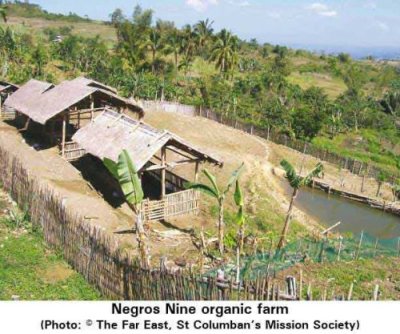
To meet these goals they will need to retain and restore surrounding forest areas; as a result a property adjacent to the farm is being sought to expand the farm.
Ownership of the farm has been vested in the Negros Nine Foundation which holds title rights to the land rather than the more common people’s rights. The Foundation is a registered charitable foundation and is run by a board elected from local people. The Foundation currently supports an “Organic Cooperative” made up of farmers from surrounding parishes, to manage and operate the various activities of the farm.
Crops, fruit trees, animal raising and forest products will form the backbone of the farm. Rice terraces will also be included. The farm is already home to a large range of animals in a large enclosure known as “Animal City”. Later, fish farming will be developed as an integral part of a complex land management programme. In its completeness and balance, it resembles uncannily the traditional use of the land.
The two administrative provinces of Negros Occidental and Negros Oriental have declared the island to be an organic island. Whatever that can be made to mean in the future, the island is currently dependent on sugar growing that makes significant use of artificial fertilisers and has a growing popularity as a biofuel source. The two are not incompatible — sugar can be grown organically — but much remains to be done.
Where does that name come from? Some will remember the “Negros Nine”. They were three priests and six community workers [1] in Negros in the Philippines jailed and falsely accused of multiple murder, sedition and firearms offences in the early 1980s. This, as a “reward” for helping organise local workers to fight against their unjust working conditions. They were released and exonerated after six months in jail. But the Columban priests were deported and the Filipino priest was appointed to far away Manila. The community workers were protected from further prosecution.
Fr Gore returned to the Philippines and is Director of the Columban Region there. In addition to these responsibilities he retains a great interest in the people of Negros.
He is working in the Negros Nine Foundation Project with some of the survivors of the Negros Nine. The local mayor and his staff are helpful. The road in to the farm is being paved. There is general community support for the Project.
Many amongst the military and the wealthy landowners are suspicious. They simply don’t understand why someone would do something not for his own benefit. They suspect Fr Brian and even work against the project. Perhaps they are fearful that this project may lead to real and significant land reform in the Philippines. Things change slowly, but at least in this project the lot of small farmers is being improved and the unjust structures that perpetuate poverty in the Philippines are being challenged.
Footnote:
[1] The Negros Nine were Filipino priest, Fr Vincente Dangan, Columbans Fr Brian Gore and Fr Niall O’Brien RIP, Conrado Muhal, Lydio Mangao, Jesus Arzaga, Peter Cuales, Ernesto Tajones and Geronimo Perez.
— by Dick Danckert
 Home | Aims and Objectives of Solidarity Philippines Australia Network | About Kasama
Home | Aims and Objectives of Solidarity Philippines Australia Network | About Kasama 
Search the SPAN Web